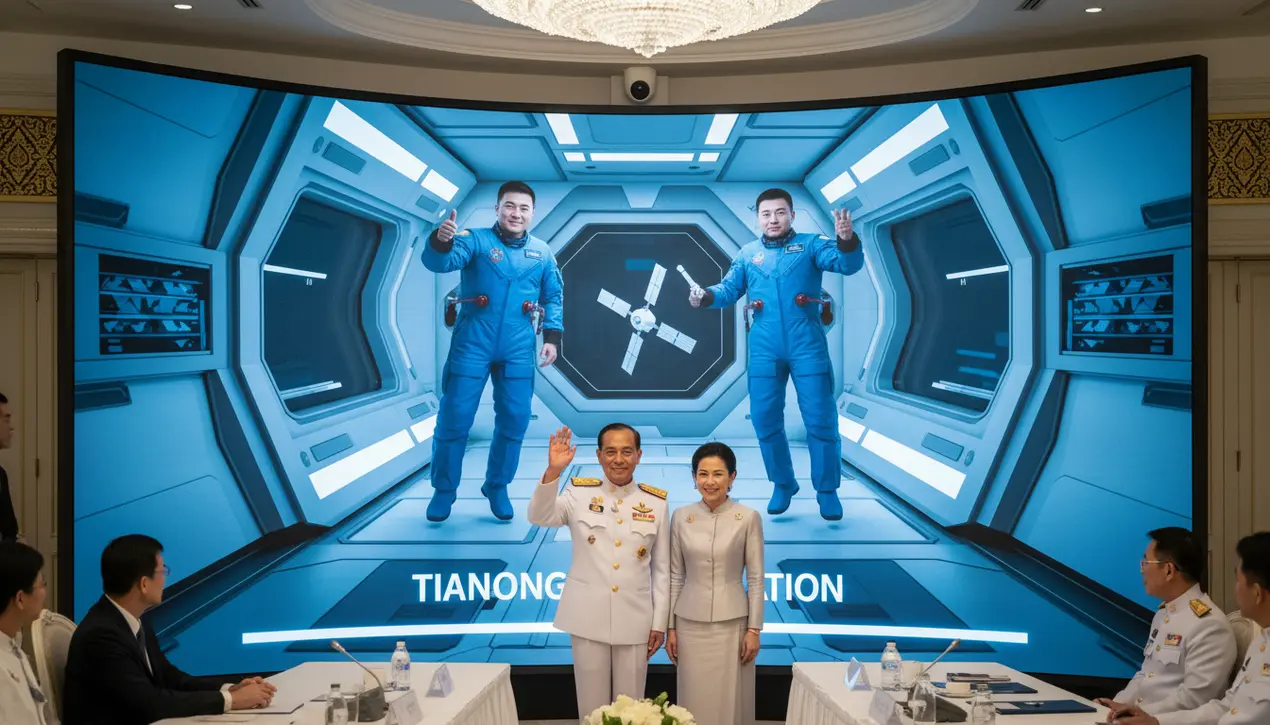
Sciencespace & astronomyNASA Missions
Thai King Greets Chinese Astronauts on Space Station.
TH
Thomas Green
2 hours ago7 min read1 comments
In a celestial diplomatic maneuver that marks a significant evolution in China's ambitious space program, the King and Queen of Thailand became the first visiting heads of state to directly address Chinese astronauts aboard the Tiangong space station. This unprecedented event, which unfolded on Sunday, saw the 73-year-old King Maha Vajiralongkorn—a trained military pilot with a lifelong passion for aviation—and Queen Suthida smiling and waving to the crew via a large video link from the 'Heavenly Palace'.This is far more than a simple courtesy call; it is a meticulously orchestrated geopolitical statement, a soft power play of cosmic proportions that underscores China's determined efforts to position its Tiangong station as a rival to the aging International Space Station (ISS) and a new hub for international collaboration, particularly with nations within its strategic Belt and Road Initiative sphere. For decades, human spaceflight has been a domain dominated by the U.S. -Russian partnership exemplified by the ISS, with access for other nations often contingent on aligning with that Western-led consortium.China's exclusion from the ISS, largely due to U. S.legislative concerns over technology transfer, forced the China Manned Space Agency (CMSA) to pursue an independent, though no less formidable, path. The completion of the three-module Tiangong station represents the crowning achievement of that decades-long, multi-billion-dollar endeavor.The Thai royal visit, therefore, is a powerful symbol of this new, alternative ecosystem in low Earth orbit. It signals to the world, especially to developing nations in Southeast Asia and beyond, that China is open for business and ready to host high-profile international partners.This is a masterclass in narrative control, transforming a once-secretive program into a platform for glamorous statecraft. The choice of Thailand as the inaugural guest is deeply strategic.As a key ASEAN member and a nation with which China has deepening economic and military ties, Thailand represents a pivotal partner in a region where geopolitical influence is fiercely contested. By granting this unique access to its monarch, China not only honors Thailand but also demonstrates the tangible benefits of its friendship.We can analyze this through the lens of historical precedent; during the Apollo era, the U. S.leveraged its lunar achievements to strengthen alliances and showcase technological supremacy during the Cold War. China is now executing a 21st-century version of this playbook, using Tiangong as a gleaming orbital embassy.The presence of King Vajiralongkorn, an aviator himself, adds a layer of genuine technical appreciation to the proceedings, making the interaction more resonant than a purely political gesture. Looking forward, this event likely sets a template.We can expect to see more leaders from nations like Pakistan, Saudi Arabia, and African partners invited for similar orbital audiences. This not only builds a coalition of space-faring nations aligned with Chinese interests but also potentially creates a market for future taikonaut selections from these countries, further solidifying dependencies.However, experts caution that this new 'space silk road' comes with strings attached, potentially tying diplomatic and economic agreements on Earth to access to the heavens. The encounter, while a triumph for China's global image, also raises questions about the militarization of space and the emergence of a bifurcated space ecosystem, one led by the traditional Western alliance and another orchestrated from Beijing. The silent, smiling taikonauts on the screen were not just crew members; they were ambassadors of a new space age, one where the final frontier is becoming the latest arena for diplomatic influence and strategic positioning.
#featured
#China space program
#Tiangong space station
#Thai King
#diplomatic visit
#astronauts
#international cooperation
Stay Informed. Act Smarter.
Get weekly highlights, major headlines, and expert insights — then put your knowledge to work in our live prediction markets.
Related News
Comments
Loading comments...
© 2025 Outpoll Service LTD. All rights reserved.